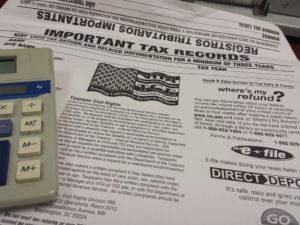Reg. § 1.41-5A Basic research for taxable years beginning before January 1, 1987
(a) In general. The amount expended for basic research within the meaning of section 30(e) (before amended by the Tax Reform Act of 1986) equals the sum of money plus the taxpayer’s basis in tangible property (other than land) transferred for use in the performance of basic research.
(b) Trade or business requirement. Any amount treated as a contract research expense under section 30(e) (before amendment by the Tax Reform Act of 1986) shall be deemed to have been paid or incurred in carrying on a trade or business, if the corporation that paid or incurred the expenses is actually engaged in carrying on some trade or business.
(c) Prepaid amounts –
(1) In general. If any basic research expense paid or incurred during any taxable year is attributable to research to be conducted after the close of such taxable year, the expense so attributable shall be treated for purposes of section 30(b)(1)(B) (before amendment by the Tax Reform Act of 1986) as paid or incurred during the period in which the basic research is conducted.
(2) Transfers of property. In the case of transfers of property to be used in the performance of basic research, the research in which that property is to be used shall be considered to be conducted ratably over a period beginning on the day the property is first so used and continuing for the number of years provided with respect to property of that class under section 168(c)(2) (before amendment by the Tax Reform Act of 1986). For example, if an item of property which is 3-year property under section 168(c) is transferred to a university for basic research on January 12, 1983, and is first so used by the university on March 1, 1983, then the research in which that property is used is considered to be conducted ratably from March 1, 1983, through February 28, 1986.
(d) Written research agreement –
(1) In general. A written research agreement must be entered into prior to the performance of the basic research.
(2) Agreement between a corporation and a qualified organization after June 30, 1983 –
(i) In general. A written research agreement between a corporation and a qualified organization (including a qualified fund) entered into after June 30, 1983, shall provide that the organization shall inform the corporation within 60 days after the close of each taxable year of the corporation what amount of funds provided by the corporation pursuant to the agreement was expended on basic research during the taxable year of the corporation. In determining amounts expended on basic research, the qualified organization shall take into account the exclusions specified in section 30(e)(3) (before amendment by the Tax Reform Act of 1986) and in paragraph (e) of this section.
(ii) Transfers of property. In the case of transfers of property to be used in basic research, the agreement shall provide that substantially all use of the property is to be for basic research, as defined in section 30(e)(3) (before amendment by the Tax Reform Act of 1986).
(3) Agreement between a qualified fund and a qualified educational organization after June 30, 1983. A written research agreement between a qualified fund and a qualified educational organization (see section 30(e)(4)(B)(iii) (before amendment by the Tax Reform Act of 1986)) entered into after June 30, 1983, shall provide that the qualified educational organization shall furnish sufficient information to the qualified fund to enable the qualified fund to comply with the written research agreements it has entered into with grantor corporations, including the requirement set forth in paragraph (d)(2) of this section.
(e) Exclusions –
(1) Research conducted outside the United States. If a taxpayer pays or incurs an amount for basic research to be performed partly within the United States and partly without, only 65 percent of the portion of the amount attributable to research performed within the United States can be treated as a contract research expense (even if 80 percent or more of the contract amount was for basic research performed in the United States).
(2) Research in the social sciences or humanities. Basic research does not include research in the social sciences or humanities, within the meaning of § 1.41-4A(c).
(f) Procedure for making an election to be treated as a qualified fund. In order to make an election to be treated as a qualified fund within the meaning of section 30(e)(4)(B)(iii) (before amendment by the Tax Reform Act of 1986) or as an organization described in section 41(e)(6)(D), the organization shall file with the Internal Revenue Service center with which it files its annual return a statement that –
(1) Sets out the name, address, and taxpayer identification number of the electing organization (the “taxpayer”) and of the organization that established and maintains the electing organization (the “controlling organization”),
(2) Identifies the election as an election under section 41(e)(6)(D) of the Code,
(3) Affirms that the controlling organization and the taxpayer are section 501(c)(3) organizations,
(4) Provides that the taxpayer elects to be treated as a private foundation for all Code purposes other than section 4940,
(5) Affirms that the taxpayer satisfies the requirement of section 41(e)(6)(D)(iii), and
(6) Specifies the date on which the election is to become effective.If an election to be treated as a qualified fund is filed before February 1, 1982, the election may be made effective as of any date after June 30, 1981, and before January 1, 1986. If an election is filed on or after February 1, 1982, the election may be made effective as of any date on or after the date on which the election is filed.
Defending Your R&E Tax Credits
We help clients defend their research tax credits. This includes helping with IRS and state audits, appeals and litigation for research tax credits.
We have defended hundreds of research tax credits.
If you have taken a research tax credit and the IRS is auditing your return, we want to hear from you.
Call us at (713) 909-4906 or schedule an appointment to discuss your research tax credit case.
R&D Tax Credit Articles
- Website Development Tax Deductions & the Start-Up Rules
 There are several tax laws that have to be considered to determine when and how costs to develop websites are deductible. These expenses are almost always deductible. These tax laws raise timing questions. It’s a matter of when the expenses… Continue reading Website Development Tax Deductions & the Start-Up Rules
There are several tax laws that have to be considered to determine when and how costs to develop websites are deductible. These expenses are almost always deductible. These tax laws raise timing questions. It’s a matter of when the expenses… Continue reading Website Development Tax Deductions & the Start-Up Rules - Enough is Enough, But An Amended Tax Return is Not
 The process for reporting taxes can be more difficult than discerning whether a tax provision applies. This complexity stems from the level of information is required to be reported. The IRS reporting requirements continue increase every year. The IRS’s decision… Continue reading Enough is Enough, But An Amended Tax Return is Not
The process for reporting taxes can be more difficult than discerning whether a tax provision applies. This complexity stems from the level of information is required to be reported. The IRS reporting requirements continue increase every year. The IRS’s decision… Continue reading Enough is Enough, But An Amended Tax Return is Not - Research Tax Credit Records Must Be Kept for 40+ Years
 A frequent question is how long one has to keep records for tax purposes. The United States v. Quebe, No. 3:15-cv-294 (S.D. Ohio 2019) case provides the answer for research tax credits. The answer is that you have to keep… Continue reading Research Tax Credit Records Must Be Kept for 40+ Years
A frequent question is how long one has to keep records for tax purposes. The United States v. Quebe, No. 3:15-cv-294 (S.D. Ohio 2019) case provides the answer for research tax credits. The answer is that you have to keep… Continue reading Research Tax Credit Records Must Be Kept for 40+ Years
More articles about the research tax credit.
In 40 minutes, we'll teach you how to survive an IRS audit.
We'll explain how the IRS conducts audits and how to manage and close the audit.

